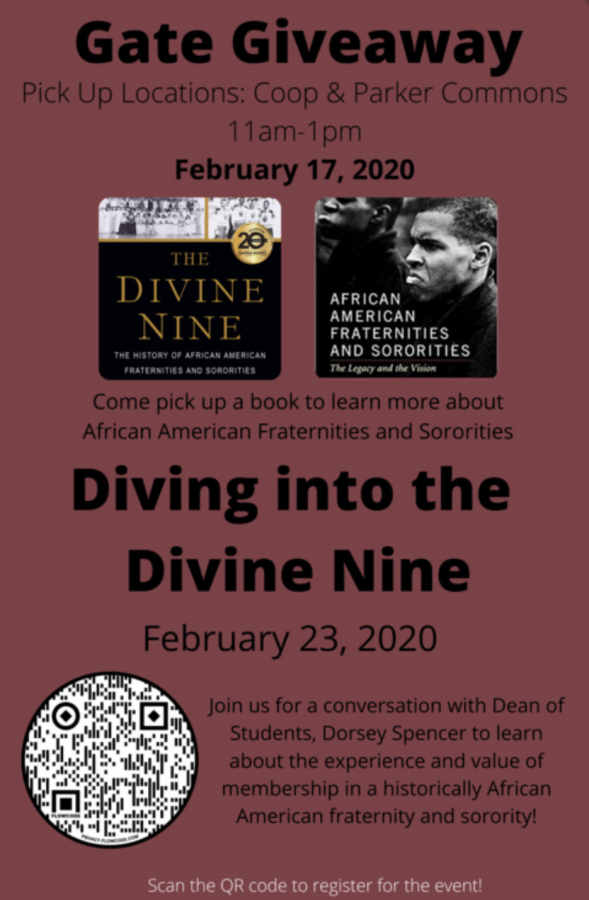Colgate Hosts Dialogue with Dean Spencer on Divine Nine Fraternities and Sororities
As part of campus-wide dialogues on the possible introduction of multicultural Greek life on campus, as well as conversations within Greek Letter organizations (GLOs) on diversity, equity and inclusion, Dean of Students Dr. Dorsey Spencer hosted a virtual conversation to educate students about a coalition of nine historically Black Greek life organizations (BGLOs) that make up the National Panhellenic Council (NHPC), referred to as the “Divine Nine.” In collaboration with the Office of Fraternity and Sorority Advising, student leaders representing various organizations on campus discussed the future of Greek Life on campus and the possibility of founding an on-campus chapter of a BGLO in the future.
BGLOs first appeared on college campuses where African American students were denied access to the historically white GLOs and other various community groups, and were originally founded as academic clubs to support Black students in their undergraduate studies. Over the last century, the Divine Nine have amassed a network of members dedicated to service, philanthropy, advocacy, mentoring and civic engagement. W.E.B. Du Bois, Dr. Martin Luther King Jr., Rosa Parks, Toni Morrison, Colin Kaepernick and Vice President Kamala Harris make up a small handful of the individuals belonging to the NPHC.
The first half of the discussion identified the historical significance of these institutions, while also addressing the missed opportunity of the many college students who are unaware of their existence. When asked about the importance of having this discussion, junior Isabel Larino, a member of Kappa Kappa Gamma, said she was embarrassed to learn that not a single black woman on campus participated in Panhellenic recruitment last fall.
“As a leader, I feel as though it’s my job to learn all I can about the history of Black students in Greek organizations and hopefully learn some things to bring back to use within our organization,” Larino said.
Spencer said the importance of educating students about BGLOs in relation to the NHPC lies in making students aware of the differences that exist in separate sectors of Greek life.
“Furthering one’s knowledge of Black Greek letter organizations can provide a more complete picture of Greek life on college campuses,” Spencer said. “Many of these organizations are not just culturally different but fundamentally. It is important to understand the nuances within fraternities and sororities.”
The remaining time was spent discussing the culture surrounding Greek life on campus, as students were prompted to think about specific ways they can work to dismantle certain negative and problematic behaviors and stereotypes. Dean Spencer recommended that one possible way forward would be to encourage more collaboration between GLOs on campus and non-affiliated groups to bolster a more community-wide effort towards service and philanthropy and work to diminish the lines of exclusivity that often separate affiliated students from their non-affiliated counterparts.
In response to inquiries about the potential for a historically black organization at Colgate, Vice President and Dean of the Colgate Paul McLoughlin emphasized the importance of sustained student interest when it comes to establishing a national chapter, and that the University would continue to explore and gauge potential interest in a multicultural organization.
“When one looks at other, larger, schools, or colleges with more recognized fraternities and sororities, the strengths come from the councils that bind these organizations, not the competition among them,” McLoughlin said. “Can we provide more options for more people rather than taking away options? I’d like to think so, and believe Colgate would be better for it.”
When asked about what he would like to see in the future of Greek life on campus, Spencer echoed many of the sentiments expressed during the virtual event that were geared towards striving for healthy and cooperative relationships among organizations.
“I would like to see a community where those who want a positive, safe, and developmental fraternity and sorority experience have the opportunity to partake in that and for students that do not desire to participate in Greek Life to develop a strong sense of community through other student organizations and involvement and thoroughly enjoy their time at Colgate University,” Spencer said.
Director of Fraternity and Sorority Advising Amber Decker said the shift in Colgate will require effort from the entire community.
“I hope to see more students attending events that our office sponsors and hosts, not only to learn more about fraternities and sororities but also to think about their positive contributions to campus and those things upon which they could improve,” Decker said. “A change in culture will necessarily come from the members who are a part of these organizations as well as the rest of the Colgate student community, working in tandem, to make a culture shift over time.”
Erin Knox is a senior from Branford, CT concentrating in English with a minor in economics. She has previously served as a staff writer for The Maroon-News....










Ed Felson • Mar 11, 2021 at 10:12 am
Another important step toward erasing Colgate’s shameful heritage as a cauldron of systemic racism and white privilege.